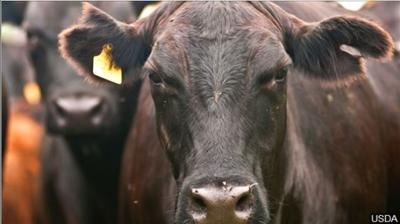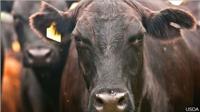(WSIL) --聽Two cases of a new, potentially dangerous, disease in cattle has been detected in Kentucky, according to Kentucky State Veterinarian Dr. Katie Flynn.
Theileria orientalis聽Ikedia, which is a protozoon known to be carried by the Asian Longhorned tick (ALT), has been diagnosed in two beef herds, one in Fleming County and the second in Hart County.
In each instance, a beef bull fell ill and died. There is no relationship between the herds.
鈥淭he Kentucky Department of Agriculture and the Office of the State Veterinarian is working closely with agriculture producers to contain these incidents and protect our herds across the state,鈥� Agriculture Commissioner Ryan Quarles said. 鈥淧rotecting the health of livestock in the commonwealth is a top priority of the Kentucky Department of Agriculture.鈥�
罢丑别颈濒别谤颈补听is a tickborne protozoa that infects red and white blood cells causing severe anemia in cattle as well as abortions, stillbirths, weakness, reluctance to walk, and death.
Physical examination may reveal pale mucus membranes, high fever and elevated heart and respiratory rates.
Once an animal is infected with聽Theileria, it becomes a carrier, which is a source of infection for other cattle in the herd. There is no approved effective treatment or vaccine for the disease, making prevention and biosecurity imperative.
Though a threat to cattle, the disease is not a threat to human health. Humans cannot become sick from contact with affected cattle, and consuming meat from affected cattle is safe provided the meat has been cooked to an appropriate temperature.
The Asian Longhorned Tick (ALT) has been found to be a primary carrier for this disease. The tick has previously been detected in Boone, Metcalfe, Floyd, Martin, Madison, Breathitt, and Perry counties in Kentucky. It is possible that the tick is present and undetected in additional Kentucky counties.聽
聽Cattle producers should consider tick control measures to lessen the likelihood of聽罢丑别颈濒别谤颈补听infections in their cattle herds.聽Tick control measures include keeping pastures mowed and cattle restricted from wooded areas.
Those who want to submit tick samples for identification or cattle blood samples for聽Theileria聽testing,can contact Kentucky Deputy State Veterinarian Dr. Kerry Barling at聽Kerry.Barling@ky.gov聽or call (502) 782-5291 for more information.














